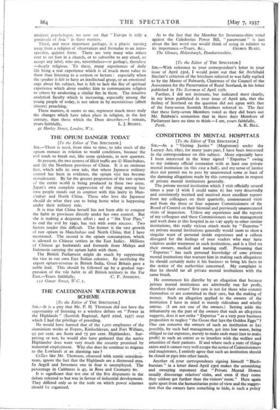THE CALEDONIAN WATER-POWER SCHEME [To the Editor of THE SPECTATOR.]
SIR,—It is a pity that Mr. P. H. Thomson did not have the opportunity of listening to a wireless debate on "Power in the Highlands" (Scottish Regional, April 22nd, 1937) over which I had the privilege of presiding.
He would have learned that of the 1,200 employees of the aluminium works at Foyers, Kinlochkven, and- Fort William, 93 per cent. are Scots and 75 per cent. Highlanders. Sur- prising or not, he would also have gathered that the native Highlander does want very much the security promised by industrial employment. Why else does he continue to migrate to the Lowlands at an alarming rate ? CrAics like Mr. Thomson, obsessed with scenic considera- tions, ignore the fact that the Highlands are a distressed area. In Argyll and Inverness one in four is unemployed. The percentage in Caithness is 45, in Ross and Cromarty 6o.
It is significant that not one of the five disputants in the debate referred to but was in favour of industrial development. They differed only as to the scale on which power schemes should te organised. As to the fact that the Member for Inverness-shire voted against the Caledonian Power Bill, " paramount " is just about the last word one would think of using in relation to its importance.—Yours, &c., GEORGE BLAKE. The Glenan, Helensburgh, Dumbartonshire.














































 Previous page
Previous page